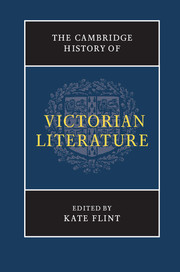Book contents
- Frontmatter
- Introduction
- PART I AUTHORS, READERS, AND PUBLISHERS
- PART II WRITING VICTORIA’s ENGLAND
- PART III MODES OF WRITING
- 7 Lyric and the lyrical
- 8 Epic
- 9 Melodrama
- 10 Sensation
- 11 Autobiography
- 12 Comic and satirical
- 13 Innovation and experiment
- 14 Writing for children
- PART IV MATTERS OF DEBATE
- PART V SPACES OF WRITING
- PART VI VICTORIAN AFTERLIVES
- Select bibliography
- Index
8 - Epic
from PART III - MODES OF WRITING
Published online by Cambridge University Press: 28 March 2012
- Frontmatter
- Introduction
- PART I AUTHORS, READERS, AND PUBLISHERS
- PART II WRITING VICTORIA’s ENGLAND
- PART III MODES OF WRITING
- 7 Lyric and the lyrical
- 8 Epic
- 9 Melodrama
- 10 Sensation
- 11 Autobiography
- 12 Comic and satirical
- 13 Innovation and experiment
- 14 Writing for children
- PART IV MATTERS OF DEBATE
- PART V SPACES OF WRITING
- PART VI VICTORIAN AFTERLIVES
- Select bibliography
- Index
Summary
Epic came to the Victorians trailing clouds of glory, and casting shadows of doubt correspondingly profound. Poets not besotted by ambition had to wonder whether that could still be the supreme muse’s call they were hearing and, if it was, how it could possibly be meant for them. Their reluctance was only deepened by the genre’s immediate prehistory. During an enthusiastic Romantic revival the fallen king of kings had been exhumed, stuffed, and reseated on its throne. Cross-dressed and class-slummed, radicalized and commodified, epic had declined far towards the categorical shorthand which mass culture has made it for us – bigness aspiring to grandeur – but which, for the Victorians, it had not yet become. Epic’s abiding prestige kept it eligible for purposes of national promotion and imperial reassurance, even as Britannia’s place at the top of a modernizing world entailed institutional and intellectual developments that seemed hardly compatible with the traditions of the genre. Accordingly this chapter grasps epic as something between a genre and a mode, whose formal conventions laboured under peculiar stress because the cultural functions they represented did too. Our core narrative will trace the historically unbroken if largely unacknowledged verse-epic tradition that connects the age of Byron to that of Pound, with collateral attention to an epic modality that emerged in prose narratives when they sought to bind Victoria’s tribe by linking distant origins to present ends and common history to heroic values.
- Type
- Chapter
- Information
- The Cambridge History of Victorian Literature , pp. 172 - 192Publisher: Cambridge University PressPrint publication year: 2012

